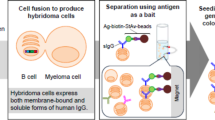
Overview
Part of the book series: Current Topics in Microbiology and Immunology (CT MICROBIOLOGY, volume 100)
Access this book
Tax calculation will be finalised at checkout
Other ways to access
About this book
Similar content being viewed by others
Keywords
Table of contents (28 papers)
-
Front Matter
Editors and Affiliations
Accessibility Information
Bibliographic Information
Book Title: T Cell Hybridomas
Book Subtitle: A Workshop at the Basel Institute for Immunology
Editors: H. V. Boehmer, W. Haas, G. Köhler, F. Melchers, J. Zeuthen
Series Title: Current Topics in Microbiology and Immunology
DOI: https://doi.org/10.1007/978-3-642-68586-6
Publisher: Springer Berlin, Heidelberg
-
eBook Packages: Springer Book Archive
Copyright Information: The Editor(s) (if applicable) and The Author(s), under exclusive license to Springer-Verlag GmbH, DE, part of Springer Nature 1982
Softcover ISBN: 978-3-642-68588-0Published: 01 November 2011
eBook ISBN: 978-3-642-68586-6Published: 06 December 2012
Series ISSN: 0070-217X
Series E-ISSN: 2196-9965
Edition Number: 1
Number of Pages: XII, 264
Topics: Medical Microbiology, Oncology, Allergology, Immunology, Virology



